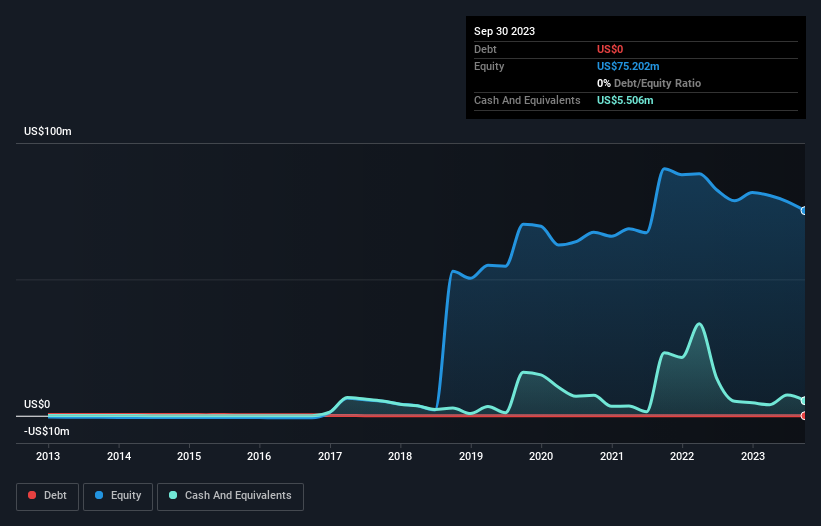We can readily understand why investors are attracted to unprofitable companies. For example, although software-as-a-service business Salesforce.com lost money for years while it grew recurring revenue, if you held shares since 2005, you'd have done very well indeed. Having said that, unprofitable companies are risky because they could potentially burn through all their cash and become distressed.
So should Rio2 (CVE:RIO) shareholders be worried about its cash burn? For the purposes of this article, cash burn is the annual rate at which an unprofitable company spends cash to fund its growth; its negative free cash flow. The first step is to compare its cash burn with its cash reserves, to give us its 'cash runway'.
Check out our latest analysis for Rio2
How Long Is Rio2's Cash Runway?
You can calculate a company's cash runway by dividing the amount of cash it has by the rate at which it is spending that cash. As at September 2023, Rio2 had cash of US$5.5m and no debt. In the last year, its cash burn was US$1.3m. Therefore, from September 2023 it had 4.1 years of cash runway. There's no doubt that this is a reassuringly long runway. The image below shows how its cash balance has been changing over the last few years.

How Is Rio2's Cash Burn Changing Over Time?
Because Rio2 isn't currently generating revenue, we consider it an early-stage business. Nonetheless, we can still examine its cash burn trajectory as part of our assessment of its cash burn situation. The good news, from a balance sheet perspective, is that it actually reduced its cash burn by 96% in the last twelve months. While that hardly points to growth potential, it does at least suggest the company is trying to survive. While the past is always worth studying, it is the future that matters most of all. So you might want to take a peek at how much the company is expected to grow in the next few years.
Can Rio2 Raise More Cash Easily?
There's no doubt Rio2's rapidly reducing cash burn brings comfort, but even if it's only hypothetical, it's always worth asking how easily it could raise more money to fund further growth. Companies can raise capital through either debt or equity. One of the main advantages held by publicly listed companies is that they can sell shares to investors to raise cash and fund growth. We can compare a company's cash burn to its market capitalisation to get a sense for how many new shares a company would have to issue to fund one year's operations.
Since it has a market capitalisation of US$44m, Rio2's US$1.3m in cash burn equates to about 3.0% of its market value. That's a low proportion, so we figure the company would be able to raise more cash to fund growth, with a little dilution, or even to simply borrow some money.
So, Should We Worry About Rio2's Cash Burn?
As you can probably tell by now, we're not too worried about Rio2's cash burn. For example, we think its cash burn reduction suggests that the company is on a good path. And even its cash burn relative to its market cap was very encouraging. Looking at all the measures in this article, together, we're not worried about its rate of cash burn; the company seems well on top of its medium-term spending needs. Separately, we looked at different risks affecting the company and spotted 2 warning signs for Rio2 (of which 1 shouldn't be ignored!) you should know about.
If you would prefer to check out another company with better fundamentals, then do not miss this free list of interesting companies, that have HIGH return on equity and low debt or this list of stocks which are all forecast to grow.
New: AI Stock Screener & Alerts
Our new AI Stock Screener scans the market every day to uncover opportunities.
• Dividend Powerhouses (3%+ Yield)
• Undervalued Small Caps with Insider Buying
• High growth Tech and AI Companies
Or build your own from over 50 metrics.
Have feedback on this article? Concerned about the content? Get in touch with us directly. Alternatively, email editorial-team (at) simplywallst.com.
This article by Simply Wall St is general in nature. We provide commentary based on historical data and analyst forecasts only using an unbiased methodology and our articles are not intended to be financial advice. It does not constitute a recommendation to buy or sell any stock, and does not take account of your objectives, or your financial situation. We aim to bring you long-term focused analysis driven by fundamental data. Note that our analysis may not factor in the latest price-sensitive company announcements or qualitative material. Simply Wall St has no position in any stocks mentioned.
About TSX:RIO
Rio2
Engages in the exploration, development, and mining of mineral properties in Canada, Peru, Bahamas, and Chile.
High growth potential with excellent balance sheet.
Market Insights
Community Narratives



